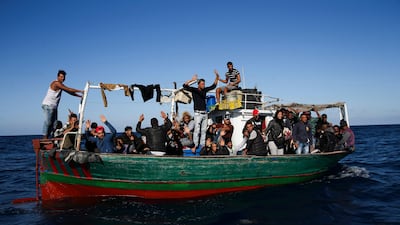A dramatic series of rescues at sea on Wednesday, which saw almost 600 refugees picked up – and an unknown number perish – from the Mediterranean as they sought to flee to Europe from Libya and further beyond has sharply highlighted how claims that the migrant crisis was diminishing in scale may be wide of the mark.
The 588 survivors were picked up by Aquarius, a search and rescue vessel run by Médecins Sans Frontières (MSF) and SOS MEDITERRANEE, from a collection of dangerously overloaded rubber boats that the migrants had put to sea in and which were intercepted by the NGOs. When one of the boats overturned, it threatened to turn into a tragedy.
“The situation suddenly turned into a nightmare when one of three rubber boats [full] with men, women and young children collapsed and dozens of people fell into sea,” said Dr Seif Khirfan, MSF’s medical doctor on board Aquarius.
“Our teams launched all available floatation devices, distributed life jackets and pulled people from the water. We were able to revive a man in cardiac arrest who was then medically evacuated by helicopter to Italy. Although no bodies were recovered, we witnessed people submerged under the water.”
As winter approaches, the Mediterranean is becoming a far more dangerous place to be stranded in than during the traditional migration months of the summer. There were multiple cases of mild to moderate hypothermia among those rescued. Injuries people had sustained while inside Libya were also treated.
“One man had an open fracture and dislocation of his left ankle which was one month old. He told me he sustained the injury trying to escape gunfire in Libya,” said Dr Khirfan. “Another man had his arm broken a week earlier while arbitrarily detained in Libya.
The rescue coincided with the release of a report by a think tank that examined the EU’s response to migrants crossing the Mediterranean, suggesting that the union was shifting from internal reforms to making deals with countries in Africa and Asia to try to halt the flow of refugees before they even leave their countries of origin or where they leave from to head to Europe.
The report, authored by Luigi Scazzieri and John Springford for the Centre for European Reform, says that “the EU’s initial ad hoc response to the migration crisis [has] slowly being formalised into a strategy to curb migration by using foreign policy to prevent migrants from crossing the Mediterranean.
“The EU’s recent dealings with Libya, which have been led by Italy, illuminate the compromises that the EU must make with third countries to curb migration. While the EU has been successful in reducing flows, by providing money to Libya and training the country’s coastguards, this deal is fragile and has come at the cost of migrants’ human rights.”
Instead, the report says that over the longer term it will only be through the union being willing to commit its considerable resources to improving security and economic opportunities in countries of origin that will slow the flow of people into Europe.
Mr Scazzieri says: “There is more scope for the EU to use its leverage to sign readmission agreements with countries of origin, or to support member-states in brokering readmission agreements. The EU can deploy a wide range of incentives in securing readmission agreements, from visa policy to aid. And the Union’s vast financial resources remain an untapped asset in fostering economic development. The EU can do more to make use of them.”
The NGOs remain more concerned by the human aspect of the migration. “People do not undertake this journey lightly, people do not risk their own lives and the lives of their children if there are easier options available to them,” said Luca Salerno, who leads MSF’s teams onboard Aquarius. “The European Union and individual member states need to take urgent action to provide safe and legal channels for people to seek asylum, create legal migration pathways and make wider use of legal entry schemes so that desperate people are not forced to risk their lives on the Mediterranean.”

